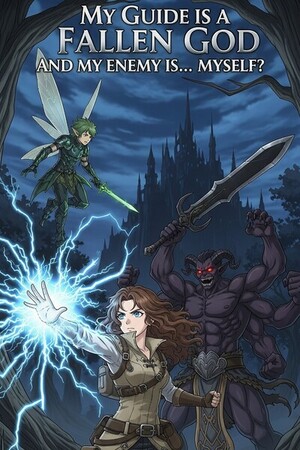Chapter 1:
The Cold Case in the Yellowed Folder
OldMind
The air in Silas’s office was the kind that didn’t so much fill your lungs as it permeated your clothes, clinging to you like a second, grimy skin. The resulting haze hung in the room like a stubborn memory, one that refused to be evicted. Nicolas leaned back, the cracked leather of the visitor’s chair groaning under his weight, and waited for his boss to finally look up from the manuscript he was scrutinizing. The papers laid out before the editor contained Nicolas’s latest story: a well-researched, meticulously detailed piece on a zoning irregularity in the city’s urban planning department. It was safe, solid, and utterly incapable of stirring anyone’s soul.
At last, Silas lifted his head. He slid his glasses off, his movements slow and deliberate, and began polishing the lenses with a soiled cloth he’d retrieved from his cluttered desk. “This,” he began, his voice possessing the dry, rough texture of gravel being scraped across pavement, “this reads like something you’d find in a municipal bulletin, Nicolas. It isn’t a news story.”
“The sources are ironclad, and every figure has been triple-checked,” Nicolas countered, struggling to keep the defensive edge from creeping into his tone.
“Who gives a damn about the figures?” Silas slipped his glasses back on, his gaze finally locking onto Nicolas. His eyes were weary, etched with the fine lines of countless deadlines, yet they held a piercing, unyielding intensity. “People don’t read numbers, son. They read stories. Tell me, can you remember what Henderson published last week?”
Nicolas fell silent. Henderson. The name alone left a bitter taste. He was the star reporter at the rival paper, the kind of journalist who could conjure a headline from thin air, who unearthed stories from places no one else even thought to look.
“I’ll tell you,” Silas continued, his voice dropping slightly. “He wrote about the corruption down at the port authority. Didn’t use a single statistic. He just told the story of a dockworker who’d been using the same rust-streaked locker for twenty years, while the port directors were swapping out their luxury sedans every six months. You see the difference? People understand that. They can feel the injustice in their bones.”
Silas leaned back, and his old chair let out a long, agonized screech of protest. “Your promotion file is sitting right here on my desk. But it’s empty, Nicolas. There’s not a single major, byline-worthy story in there that has your name on it. Just… a collection of well-written reports. I’m an editor, not an accountant.”
The barb struck its intended target. A muscle in Nicolas’s jaw twitched, a subtle but telling reaction. “Then give me something,” he said, his voice low but firm. “A lead. A thread I can pull on.”
“There are no leads,” Silas snapped, his patience wearing thin. “This business isn’t for people who wait for leads. It’s for the ones who create them.” He rummaged through a chaotic pile of documents on his desk and extracted a thin, yellowed folder, its edges softened with age. He slid it across the desk toward Nicolas. “Here. These are the cold cases, the ones everyone in this building has taken a crack at and failed to solve. A collection of dead ends. Maybe you’ll see something your predecessors missed. Just bring me a result. The kind of result Henderson would slam down on my desk.”
Nicolas took the folder. The texture of the worn cardboard felt like a testament to forgotten things. “Understood,” was all he managed to say. As he stepped out of the office, the bustling chaos of the newsroom hit him like a physical wall. The rhythmic, staccato symphony of keyboards, the shrill, insistent melody of ringing telephones, and the muffled roar of people rushing to meet their deadlines… It was a familiar cacophony. Across the room, he could see Henderson’s desk; the man himself was on the phone, speaking with an animated fervor, his face illuminated with the triumphant expression of a predator closing in on its prey. Nicolas quickly averted his gaze and walked out of the building. The city’s humid evening air wrapped around him, a clammy embrace that offered no comfort.
His apartment, when he finally reached it, was not the sanctuary he craved; it was merely a destination, a waypoint between shifts. The space was defined by cheap, flat-pack furniture, takeout containers left on the kitchen counter, and neutral-colored walls that held no personal warmth, no trace of a life lived within them. All except for one wall.
That wall was Nicolas’s cathedral. It was a monument to both his madness and his hope.
He dropped his jacket to the floor and walked directly to it. The wall was a geographical map of his professional failures. A frantic web of crimson yarn connected newspaper clippings, grainy photos of suspicious figures, and maps marked with colored pushpins. Each cluster represented a story that had once promised a career-defining breakthrough but had ultimately collapsed into a dead end. An untouchable businessman with political ties, a court case whose witnesses vanished one by one, a conspiracy whose evidence was “accidentally” incinerated in a warehouse fire…
He opened the folder Silas had given him. He took out the few sheets of paper inside and pinned them to the most barren section of the wall. These were different from his other cases. While his own files overflowed with information, witness statements, and official reports, these were almost entirely silent. One, in particular, seemed to whisper from among the others: “OldMind Studios – Cessation of Activities.”
It had happened five years ago. OldMind was a company poised to become the next titan of the gaming industry. Tech blogs had been overflowing with breathless praise for the revolutionary, next-generation virtual reality engine they were developing. Then, on a Tuesday morning, everything had simply stopped. The company had shuttered its doors overnight. There was no bankruptcy filing, no public scandal, no press release offering an explanation. They had simply existed, and then, they had evaporated.
Nicolas moved to his computer, the wheels of his chair groaning on the worn floorboards. His fingers hovered over the keyboard as his mind raced, sifting through possibilities. "OldMind founders." "OldMind former employees." "OldMind bankruptcy." Every keyword he typed into the search engine led him to the same digital void. He found only online advertisements, irrelevant forum discussions, and a handful of decade-old game reviews praising the company’s first, long-forgotten title. That was it. When he tried to access the official corporate registry records, he was met with a cold, bureaucratic barrier: “Records Sealed Under Civil Investigation.”
It was impossible. A company, especially a tech firm with hundreds of employees, couldn’t just vanish without leaving a digital footprint. This was more than a simple cover-up; this felt like a systematic erasure of existence, a digital scorched-earth campaign.
Nicolas leaned back, staring at his own faint silhouette reflected on the monitor. The information wasn't in the wires and servers. If it existed anywhere, it could only be in one place: the physical space where it all began, and where it all ended.
He pulled up a map on his phone. The former headquarters of OldMind Studios was located in a derelict industrial district on the edge of the city, a place the modern world had left to rust. It wasn’t too far.
The digital world had sealed its gates to him. Fine. He would simply have to knock on the one made of concrete and steel.
He stood up, his movements now sharp and decisive. He crossed the room and pulled open the bottom drawer of his desk. From a small velvet pouch within, he took his keys and a compact, high-powered flashlight. For a moment, his fingers brushed against the cool metal at the bottom of the pouch. A set of lockpicks, untouched for years, a relic from his more reckless days in journalism school. His father's warning echoed in his mind, a gentle caution from the past: “Not every door is meant to be opened.” But Silas’s gruff voice was louder, more urgent: “It’s for the ones who create them.”
He slipped the lockpick set into his pocket. Outside, the sky had deepened into a starless black.




Please sign in to leave a comment.